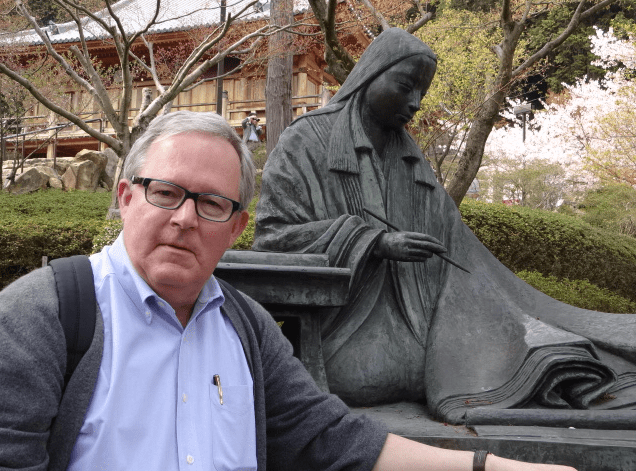Students will stay in a hotel near Doshisha University, one of Japan’s most distinguished universities. In addition to two courses in linguistics (see below), the program will take advantage of Doshisha’s excellent location to explore several aspects of Japanese history and culture, guided by Doshisha faculty. Kyoto was the capital of Japan and the heart of its cultural life for a millennium, until 1868. Students will visit many important local sites, as well as take excursions to Tokyo and Hiroshima.
One important feature of the seminar is that there will be a group of Doshisha University students, the Doshisha Peers, who will be a part of the program. Together, the two groups will have academic and social events, and the Japanese students will also serve as informal guides to Kyoto and introduce Carleton students to various aspects of Japanese society, as seen by university students.
The program begins with a three-day orientation in Tokyo, intended to introduce students to important aspects of Japanese society.
During the orientation, students will acquire skills for handling day-to-day situations in Japan through learning basic Japanese and Japanese etiquette and developing skills for exploring unknown areas. Students will learn useful phrases for greetings, table manners, and managing Japan’s elaborate subway systems, and how to behave in an izakaya, a popular type of gathering place for college students.
The main academic focus of the seminar is on linguistics. There will be two required courses in this area. One, taught by the director, will be on the linguistics of the Japanese writing system, which is surely one of the most complicated and controversial systems in the world. The second linguistics course will be on the structure of Japanese. It will be taught by Doshisha faculty and will include an examination of several aspects of the language, including phonology, morphology, syntax, and pragmatics. The lone prerequisite for the seminar is at least one course in linguistics.
- To explore the linguistics of Japanese in-depth and with theoretical sophistication
- To learn about Japan and the Japanese culture
- To become comfortable exploring Japan individually or in small groups
- To develop friendships with Japanese students that transcend the boundaries of the seminar
The seminar is open to all Carleton students who will have sophomore, junior, or senior status in the 2022-23 academic year. Students must complete at least one course in the Linguistics Department at Carleton before the beginning of the seminar. Prior knowledge of Japanese is not required.
18 Credits
LING 285: The Linguistics of the Japanese Writing System (6 credits)
The Japanese writing system is often said to be the most complicated in the world, even as Japan has among the very highest literacy rates. In this course, we will closely examine this extraordinary aspect of Japanese society, including its history, relationship with the spoken language, psychological processing, and neural implementation. Finally, we will examine the controversy concerning the use of Kanji, its political ramifications, and look at how the Japanese are responding to various pressures on the system. Experience with Japanese is not necessary. Prerequisite: 100-level Linguistics course.
Instructor: Michael Flynn
LING 286: The Structure of Japanese (6 credits)
This course examines the nature of the Japanese language through the lens of contemporary linguistic theory. Topics include the history of the language, its sound structure, word formation operations, syntax, and its use in social and artistic contexts. This course is not intended to teach students to speak Japanese, and while experience with Japanese would be helpful, it is not necessary. Prerequisite: 100-level Linguistics course.
Instructor: Doshisha faculty
ASST 284: History and Culture of Japan (6 credits)
This course is an introduction to several aspects of Japanese society, taking advantage of the location of the Linguistics OCS seminar in Kyoto. It consists of readings and lectures about important events in historical and contemporary Japan, and will include visits to sites that illuminate those events in important ways. In addition to Kyoto and nearby places, there will be excursions to Tokyo and Hiroshima.
Instructor: Doshisha faculty
Michael Flynn, William H. Laird Professor of Linguistics and the Liberal Arts
Michael Flynn is a member of Carleton’s Linguistics Department. He has been the Resident Director of the Japan Study Program at Waseda University in Tokyo, and has been a Visiting Faculty Fellow at the Associated Kyoto Program at Doshisha University in Kyoto. He has also been a visiting professor at Keio University and Chuo University, both in Tokyo, and at Doshisha University. Professor Flynn designed the seminar and was the director of its first four instantiations in the spring of 2012, 2014, 2016 and 2018.
During the orientation session in Tokyo, housing will be at a business hotel, located in Shinjuku, one of the busiest and most interesting parts of Tokyo.
In Kyoto, students will be housed in a Doshisha University dorm. Most meals will be available at the university and there are many restaurants nearby.
In addition to a three-day orientation in Tokyo at the beginning of the program, students will go to Hiroshima and return to Tokyo for extended visits.
Program dates roughly correspond to the Carleton academic term. Specific dates will be communicated to program participants.
All Carleton-sponsored 10-week off-campus study programs charge the Carleton comprehensive fee, which includes instruction, room and board, group excursions, public transportation, medical and evacuation insurance, travel assistance, and most cultural events.
Students are responsible for books and supplies, passports and visas (when required), transportation to and from the program sites, and personal expenses and travel during the seminar. Students will receive a program-specific Additional Cost Estimate at the time of acceptance.
Student financial aid is applicable as on campus. See the Off-Campus Studies website for further information on billing, financial aid, and scholarships.
